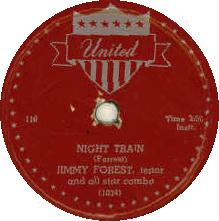
William Ballard Doggett was an American pianist and organist. He began his career playing swing music before transitioning into rhythm and blues. Best known for his instrumental compositions "Honky Tonk" and "Hippy Dippy", Doggett was a pioneer of rock and roll. He worked with the Ink Spots, Johnny Otis, Wynonie Harris, Ella Fitzgerald, and Louis Jordan.
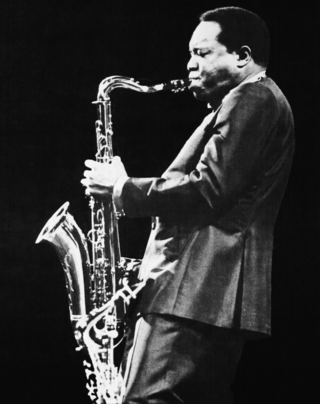
Curtis Ousley, known professionally as King Curtis, was an American saxophonist who played rhythm and blues, jazz, and rock and roll. A bandleader, band member, and session musician, he was also a musical director and record producer. A master of the instrument, he played tenor, alto, and soprano saxophone. He played riffs and solos on hit singles such as "Respect" by Aretha Franklin (1967), and "Yakety Yak" by The Coasters (1958) and his own "Soul Twist" (1962), "Soul Serenade" (1964), and "Memphis Soul Stew" (1967).
The swing era was the period (1933–1947) when big band swing music was the most popular music in the United States. Though this was its most popular period, the music had actually been around since the late 1920s and early 1930s, being played by black bands led by such artists as Duke Ellington, Jimmie Lunceford, Bennie Moten, Cab Calloway, Earl Hines, and Fletcher Henderson, and white bands from the 1920s led by the likes of Jean Goldkette, Russ Morgan and Isham Jones. An early milestone in the era was from "the King of Swing" Benny Goodman's performance at the Palomar Ballroom in Los Angeles on August 21, 1935, bringing the music to the rest of the country. The 1930s also became the era of other great soloists: the tenor saxophonists Coleman Hawkins, Ben Webster and Lester Young; the alto saxophonists Benny Carter and Johnny Hodges; the drummers Chick Webb, Gene Krupa, Jo Jones and Sid Catlett; the pianists Fats Waller and Teddy Wilson; the trumpeters Louis Armstrong, Roy Eldridge, Bunny Berigan, and Rex Stewart.

"I Got You (I Feel Good)" is a song by American singer James Brown. First recorded for the album Out of Sight and then released in an alternate take as a single in 1965, it was his highest-charting song and is arguably his best-known recording. In 2013, the 1965 recording was inducted into the Grammy Hall of Fame.
"Take the 'A' Train" is a jazz standard by Billy Strayhorn that was the signature tune of the Duke Ellington orchestra.

"Papa's Got a Brand New Bag" is a song written and recorded by James Brown. Released as a two-part single in 1965, it was Brown's first song to reach the Billboard Hot 100 Top Ten, peaking at number eight, and was a number-one R&B hit, topping the charts for eight weeks. It won Brown his first Grammy Award, for Best Rhythm & Blues Recording.
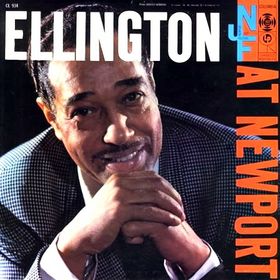
Ellington at Newport is a 1956 live jazz album by Duke Ellington and his band of their 1956 concert at the Newport Jazz Festival, a concert which revitalized Ellington's flagging career. Jazz promoter George Wein describes the 1956 concert as "the greatest performance of [Ellington's] career... It stood for everything that jazz had been and could be." It is included in the book 1001 Albums You Must Hear Before You Die, which ranks it "one of the most famous... in jazz history". The original release was partly recreated in the studio after the Ellington Orchestra's festival appearance.

James Robert Forrest Jr. was an American jazz musician who played tenor saxophone throughout his career.

"Train Kept A-Rollin'" is a song first recorded by American jazz and rhythm and blues musician Tiny Bradshaw in 1951. Originally performed in the style of a jump blues, Bradshaw borrowed lyrics from an earlier song and set them to an upbeat shuffle arrangement that inspired other musicians to perform and record it. Johnny Burnette and the Rock and Roll Trio made an important contribution in 1956 – they reworked it as a guitar riff-driven song, which features an early use of intentionally distorted guitar in rock music.

"C Jam Blues" is a jazz standard composed in 1942 by Duke Ellington and performed by countless other musicians, such as Dave Grusin, Django Reinhardt, Oscar Peterson, and Charles Mingus.
"Cold Sweat" is a song performed by James Brown and written with his bandleader Alfred "Pee Wee" Ellis. Brown recorded it in May 1967. An edited version of "Cold Sweat" released as a two-part single on King Records was a No. 1 R&B hit, and reached number seven on the Pop Singles chart. The complete recording, more than seven minutes long, was included on an album of the same name.

The Famous Flames were an American rhythm and blues, soul vocal group founded in Toccoa, Georgia, in 1953 by Bobby Byrd. James Brown first began his career as a member of the Famous Flames, emerging as the lead singer by the time of their first appearance in a professional recording, "Please, Please, Please", in 1956.
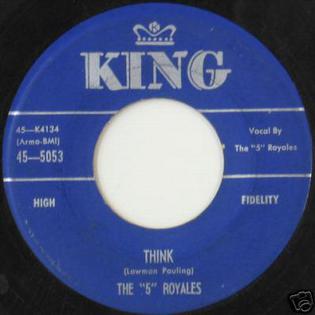
"Think" is a rhythm and blues song written by Lowman Pauling and originally recorded by his group The "5" Royales. Released as a single on King Records in 1957, it was a national hit and reached number nine on the U.S. R&B chart.

"(Do the) Mashed Potatoes" is a rhythm and blues instrumental. It was recorded by James Brown with his band in 1959 and released as a two-part single in 1960. For contractual reasons the recording was credited to "Nat Kendrick and the Swans".
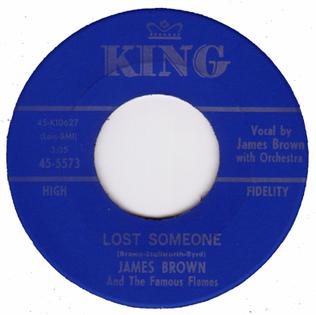
"Lost Someone" is a song recorded by James Brown in 1961. It was written by Brown and Famous Flames members Bobby Byrd and Baby Lloyd Stallworth. Like "Please, Please, Please" before it, the song's lyrics combine a lament for lost love with a plea for forgiveness. The single was a #2 R&B hit and reached #48 on the pop chart. According to Brown, "Lost Someone" is based on the chord changes of the Conway Twitty song "It's Only Make Believe". Although Brown's vocal group, The Famous Flames did not actually sing on this tune, two of them, Bobby Byrd, and "Baby Lloyd " Stallworth, co-wrote it with Brown, and Byrd plays organ on the record, making it, in effect, a James Brown/Famous Flames recording.
"Cotton Tail" is a 1940 composition by Duke Ellington. It is based on the rhythm changes from George Gershwin's "I Got Rhythm". The first Ellington recording is notable for the driving tenor saxophone solo by Ben Webster. Originally an instrumental, "Cotton Tail" later had lyrics written for it by Ellington. Later, more lyrics were written, based on the 1940 recording, by Jon Hendricks, and recorded by Lambert, Hendricks and Ross.

"I Don't Mind" is a rhythm and blues song written by James Brown and performed by Brown and the Famous Flames. Released as a single in 1961, it reached number four in the R&B Billboard charts and number 47 in the Pop Billboard charts. Brown and the Flames also performed it on their 1963 album Live at the Apollo

The period from the end of the First World War until the start of the Depression in 1929 is known as the "Jazz Age". Jazz had become popular music in America, although older generations considered the music immoral and threatening to cultural values. Dances such as the Charleston and the Black Bottom were very popular during the period, and jazz bands typically consisted of seven to twelve musicians. Important orchestras in New York were led by Fletcher Henderson, Paul Whiteman and Duke Ellington. Many New Orleans jazzmen had moved to Chicago during the late 1910s in search of employment; among others, the New Orleans Rhythm Kings, King Oliver's Creole Jazz Band and Jelly Roll Morton recorded in the city. However, Chicago's importance as a center of jazz music started to diminish toward the end of the 1920s in favor of New York.
